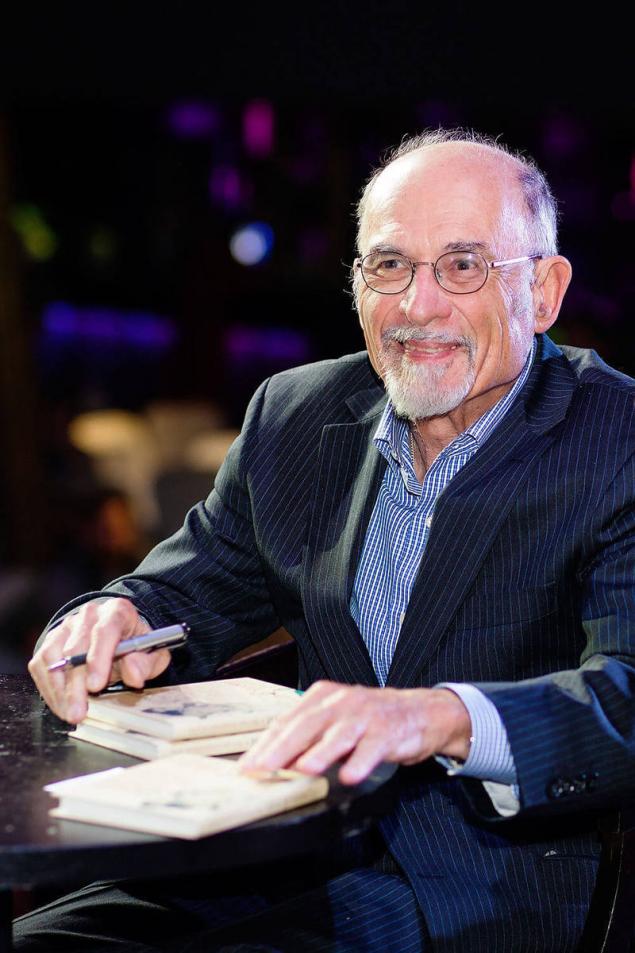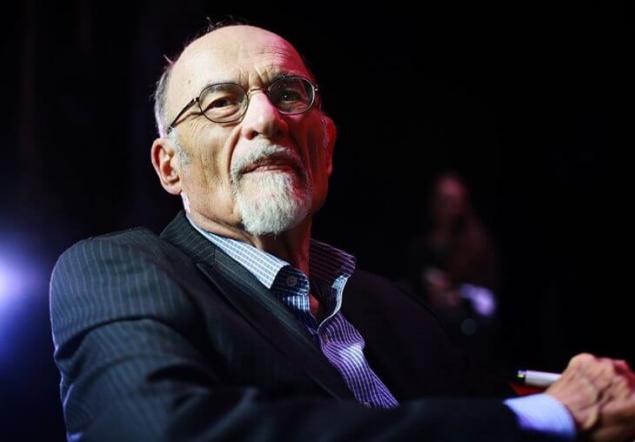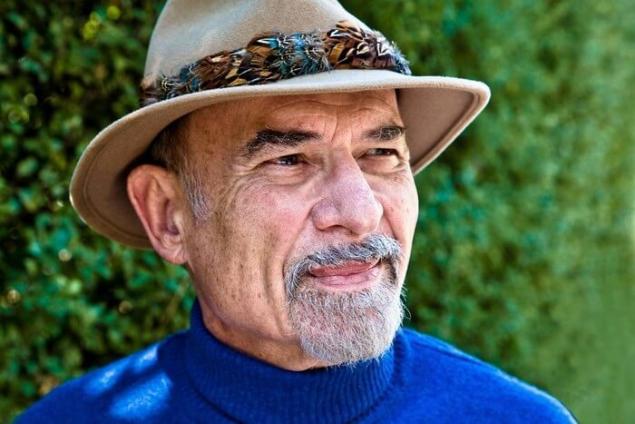507
Two professions Irving aloma
Irvin David Yalom (born. Irvin David Yalom; June 13, 1931, Washington, U.S.) is an American psychiatrist and psykoterapi, doctor of medicine, Professor of psychiatry at Stanford University; known as the author of popular scientific and fiction literature. The article is prepared on materials of a live performance of Irving aloma 14 April 2016 at the Higher school of Economics.
On the love of reading since childhood
I lived in a seedy area where it was dangerous to go outside. My parents in this poor neighborhood was the shop. And I spent a lot of time in the library, read a lot. I have always loved reading, at the age of 15 because of this, we met my future wife — we both loved to read.

And then I loved to write. At school my compositions were always the best. Think I'm a good writer. I love to write.
Memoirs
Now I'm working on a memoir and a lot of thinking about what happened earlier in my life. Maybe this will be my last book. I've finished about three quarters. It will be an autobiography where I talk about my life.
I include all books written by me and all my family members and my research, my observations. For me, this book is very interesting, I hope it will be interesting to the reader.
As I'm writing a memoir, I read all his books one by one. And it's very exciting for me to read their own works.
For example, the book "Mommy and the meaning of life" — is not so popular compared to others, but it affects me much deeper than the others in many aspects. It starts with the history of relations between my mother and me. I think it's the best life story I've ever read. And this is a very true story.
The book contains many other stories that are intertwined, and that is very important for me. There is a story of a patient with the young husband, which is called "8 lessons in advanced psychotherapy" — about how to teach a young therapist to cope with any difficult situations they might face at work. This is a very intelligent story and at the same time very aggressive, I would even say angry.
There is a very emotional story about a woman who suffered and died from breast cancer. In the book her name is Floor. In the literature this has never been described.
And I love the story "the Hungarian cat Curse" — about how I had a very good but very strange therapy because the patient is a cat with a talking head. This story was heavily criticized due to the fact that there is combined a documentary narrative and fiction. But you know, some fragments of this story are very strong, and I want part of this story is dialogue between a therapist and a talking cat — was certainly read by my sons.

I recently reread the book "When Nietzsche wept". When I wrote this book, I read a lot of Nietzsche: his writings, his letters. And at some point I could practically feel his voice, I used his words, his quotes, and even its syntax. Was very powerful prose, like the prose of Nietzsche.
Now I can't write. By the way, it turned out that the phrase Nietzsche I'm going to use for the title of his memoirs. If I may...
The last couple of weeks I read the book "Schopenhauer as medicine". When people ask me how to become a good therapist, what training to undergo, I always answer: "I want you to read this book." I refer to certain pages from this book, because they act as a very good illustration of my understanding of a "good therapist." I say: "Be like Joyce (the therapist from the book). This is an example of an excellent therapist".
And another book I wrote, called "the Spinoza Problem". I have included in the plot of the novel fictional character – a friend of Spinoza, with whom they talk a lot. Another Nazi friend — was in real life. And there are still a few heroes — psychotherapists. This book on Spinoza and the Nazis. The great German writers loved Spinoza. For example, Goethe always carried a famous work of Spinoza "Ethics". The problem was this: if the Jews were such a degenerate nation, why the great German and not only thinkers so they were appreciated? So my book is called "the Spinoza Problem".
Recently I re-read it and discover anew...
The fear of death
Many people are very much afraid of death. Almost every person thinks about it. If you ask how they relate to death, all at once and lay the phone think about it. Understand that life is finite and everyone will die. I think that's the fundamental fear that other fears can't "overlap". Overcoming the fear of death is the awakening to life. Life is finite, we only have one life and we want to live it the best way.

In the film "the Healing of aloma" I say to one patient: "Imagine a line, where on the one hand point to the day of your birth, the other your death. Put a dot where you think you are now on this line". A life line that has a beginning and an end, and it helps to think about how is to live this life.
When I started writing the book "Existential psychology", I felt that the question of death is very important for psychotherapy in General. I turned to philosophy, to questions of existence, existentialism. I studied Sartre, Camus, Dostoevsky, Kafka and others. I already knew that a significant part of my work is dealing with death and thought about how to talk with their patients about death and how to use it in psychotherapy.
Eventually I began working with patients who face the threat of death daily, those who are sick of some deadly disease. It was patients with the diagnosis "cancer". And one day one of the patients said to me, "what a pity that I had to wait until now, when my body conquered cancer, and only now I understood how to live. I appreciated life from a different angle, from a different perspective. I realized that it was possible to live differently".
I have the book "Staring at the sun", where I write about the fact that there are two things we cannot stare. Can't look at the sun, because we will burn the eyes. And we can't look at death because we are destroying ourselves. It is really so. But if we begin staring at the death, not whether we come to the fact that we like something new take a look at your life?
This topic has some thoughts Leo Tolstoy. In his story "the Death of Ivan Ilyich" is a great story, one of the strongest themes in the literature. A businessman dies, and the only person who care for him, is his servant. He tries to help his master in his last days of life. And the insight this man, he says to himself: "I die hard, because I have lived wrong." When he lived, his life had no such sense, but in the last days of their lives on Earth, he realized that he suffers from the fact that he lived wrong.
I don't know how popular in Russia Dickens, but he describes a similar story in his book "a Christmas Carol". The main character's name is Scrooge, he is greedy, a very unpleasant man. And suddenly to it the spirit comes from the future, and Scrooge sees his own death, his own funeral to which nobody comes. He sees that prospect, and says: "now I become a different person."
And Scrooge completely changes his life, becomes more open, generous, more compassionate to the people who surrounded him.
When we think about death, we're trying to figure out what we get to it. What is our life before death. And here we can learn a lot. We can learn a lot about death, living our lives.
About the profession therapist
In the book "the Gift of therapy," the last two pages devoted to the question of how to experience joy and pleasure from what you are therapist. You need to get pleasure from the fact that you're helping other people. You walk into the intimate lives of others. And this feeling that I help my patients and be a part of their life, it is very important to me and my life.
I was also occupied with the question of how should open the therapist to the client. Whether to support old Freudian approach, which is called "transparent screen"? And is it possible to go too far, telling the patient about yourself?
In the book "the Liar on the couch" I describe the experiment carried out by one therapist -- He asks: "What will happen if I tell the patient everything?"...
A similar experiment conducted by one of the colleagues of Freud – Sandor Ferenczi (Hungarian psychoanalyst). He experimented much more with therapy than Freud, and one day decided to try to do a double analysis to the contrary. One of his patients was an analyst, and the first hour that he could analyze his patient, and the next hour — his patient would analyze it.
In my book you can read where you can go to a similar experiment... "the Liar on the couch" is a comic book Comedy. Recently, I was driving in the car, listened to the audio version and laughed out loud in several places. I think that this is a very funny book. In addition, this is a book where I reveal very personal things about yourself. Readers may not know it, but everything in this book describes a part of my life, my real friends, playing poker, furniture, my house and other details. All the people there who described themselves know.
When I finished this book, my wife read it and wrote in big letters on the last page: "is There something about you and your sexual fantasies, what you're not told the entire North America?" In this book I have revealed too much...
If to talk about my relationships with patients, came to the conclusion that people are far more important to have real contact with another person. You need to sincerely treat a person, be yourself. I am always very sincerely build relationships with patients and many are willing to open up about yourself in this relationship. More than other therapists, I think. If the patient asks, "do you Have children? Are you married?", I always honestly answer these questions. What? Why don't you answer? Why not build these relationships?
But many therapists are afraid to talk about yourself too much. They reason that "If you start to answer the questions of the patient about himself, where will this lead? But if patients begin to ask more and more indiscreet questions? Start asking how much you masturbate or something in this spirit...". But patients do not. And if someone asks about it, the therapist might ask: "Tell me, what's the benefit of this issue? Why do you want to put me in an awkward position?". And this will only strengthen your relationship.
Also interesting: Irvin Yalom: Heals nothing like a relationship
About a premature decision
"Here and now" – here's how to build relationships between therapist and client. So I'm always open, ready to tell a lot about yourself.
P. S. And remember, only by changing their consumption — together we change the world! ©
Source: psy-practice.com/publications/psikhicheskoe-zdorove/dve-professii-irvina-yaloma/
On the love of reading since childhood
I lived in a seedy area where it was dangerous to go outside. My parents in this poor neighborhood was the shop. And I spent a lot of time in the library, read a lot. I have always loved reading, at the age of 15 because of this, we met my future wife — we both loved to read.

And then I loved to write. At school my compositions were always the best. Think I'm a good writer. I love to write.
Memoirs
Now I'm working on a memoir and a lot of thinking about what happened earlier in my life. Maybe this will be my last book. I've finished about three quarters. It will be an autobiography where I talk about my life.
I include all books written by me and all my family members and my research, my observations. For me, this book is very interesting, I hope it will be interesting to the reader.
As I'm writing a memoir, I read all his books one by one. And it's very exciting for me to read their own works.
For example, the book "Mommy and the meaning of life" — is not so popular compared to others, but it affects me much deeper than the others in many aspects. It starts with the history of relations between my mother and me. I think it's the best life story I've ever read. And this is a very true story.
The book contains many other stories that are intertwined, and that is very important for me. There is a story of a patient with the young husband, which is called "8 lessons in advanced psychotherapy" — about how to teach a young therapist to cope with any difficult situations they might face at work. This is a very intelligent story and at the same time very aggressive, I would even say angry.
There is a very emotional story about a woman who suffered and died from breast cancer. In the book her name is Floor. In the literature this has never been described.
And I love the story "the Hungarian cat Curse" — about how I had a very good but very strange therapy because the patient is a cat with a talking head. This story was heavily criticized due to the fact that there is combined a documentary narrative and fiction. But you know, some fragments of this story are very strong, and I want part of this story is dialogue between a therapist and a talking cat — was certainly read by my sons.

I recently reread the book "When Nietzsche wept". When I wrote this book, I read a lot of Nietzsche: his writings, his letters. And at some point I could practically feel his voice, I used his words, his quotes, and even its syntax. Was very powerful prose, like the prose of Nietzsche.
Now I can't write. By the way, it turned out that the phrase Nietzsche I'm going to use for the title of his memoirs. If I may...
The last couple of weeks I read the book "Schopenhauer as medicine". When people ask me how to become a good therapist, what training to undergo, I always answer: "I want you to read this book." I refer to certain pages from this book, because they act as a very good illustration of my understanding of a "good therapist." I say: "Be like Joyce (the therapist from the book). This is an example of an excellent therapist".
And another book I wrote, called "the Spinoza Problem". I have included in the plot of the novel fictional character – a friend of Spinoza, with whom they talk a lot. Another Nazi friend — was in real life. And there are still a few heroes — psychotherapists. This book on Spinoza and the Nazis. The great German writers loved Spinoza. For example, Goethe always carried a famous work of Spinoza "Ethics". The problem was this: if the Jews were such a degenerate nation, why the great German and not only thinkers so they were appreciated? So my book is called "the Spinoza Problem".
Recently I re-read it and discover anew...
The fear of death
Many people are very much afraid of death. Almost every person thinks about it. If you ask how they relate to death, all at once and lay the phone think about it. Understand that life is finite and everyone will die. I think that's the fundamental fear that other fears can't "overlap". Overcoming the fear of death is the awakening to life. Life is finite, we only have one life and we want to live it the best way.

In the film "the Healing of aloma" I say to one patient: "Imagine a line, where on the one hand point to the day of your birth, the other your death. Put a dot where you think you are now on this line". A life line that has a beginning and an end, and it helps to think about how is to live this life.
When I started writing the book "Existential psychology", I felt that the question of death is very important for psychotherapy in General. I turned to philosophy, to questions of existence, existentialism. I studied Sartre, Camus, Dostoevsky, Kafka and others. I already knew that a significant part of my work is dealing with death and thought about how to talk with their patients about death and how to use it in psychotherapy.
Eventually I began working with patients who face the threat of death daily, those who are sick of some deadly disease. It was patients with the diagnosis "cancer". And one day one of the patients said to me, "what a pity that I had to wait until now, when my body conquered cancer, and only now I understood how to live. I appreciated life from a different angle, from a different perspective. I realized that it was possible to live differently".
I have the book "Staring at the sun", where I write about the fact that there are two things we cannot stare. Can't look at the sun, because we will burn the eyes. And we can't look at death because we are destroying ourselves. It is really so. But if we begin staring at the death, not whether we come to the fact that we like something new take a look at your life?
This topic has some thoughts Leo Tolstoy. In his story "the Death of Ivan Ilyich" is a great story, one of the strongest themes in the literature. A businessman dies, and the only person who care for him, is his servant. He tries to help his master in his last days of life. And the insight this man, he says to himself: "I die hard, because I have lived wrong." When he lived, his life had no such sense, but in the last days of their lives on Earth, he realized that he suffers from the fact that he lived wrong.
I don't know how popular in Russia Dickens, but he describes a similar story in his book "a Christmas Carol". The main character's name is Scrooge, he is greedy, a very unpleasant man. And suddenly to it the spirit comes from the future, and Scrooge sees his own death, his own funeral to which nobody comes. He sees that prospect, and says: "now I become a different person."
And Scrooge completely changes his life, becomes more open, generous, more compassionate to the people who surrounded him.
When we think about death, we're trying to figure out what we get to it. What is our life before death. And here we can learn a lot. We can learn a lot about death, living our lives.
About the profession therapist
In the book "the Gift of therapy," the last two pages devoted to the question of how to experience joy and pleasure from what you are therapist. You need to get pleasure from the fact that you're helping other people. You walk into the intimate lives of others. And this feeling that I help my patients and be a part of their life, it is very important to me and my life.
I was also occupied with the question of how should open the therapist to the client. Whether to support old Freudian approach, which is called "transparent screen"? And is it possible to go too far, telling the patient about yourself?
In the book "the Liar on the couch" I describe the experiment carried out by one therapist -- He asks: "What will happen if I tell the patient everything?"...
A similar experiment conducted by one of the colleagues of Freud – Sandor Ferenczi (Hungarian psychoanalyst). He experimented much more with therapy than Freud, and one day decided to try to do a double analysis to the contrary. One of his patients was an analyst, and the first hour that he could analyze his patient, and the next hour — his patient would analyze it.
In my book you can read where you can go to a similar experiment... "the Liar on the couch" is a comic book Comedy. Recently, I was driving in the car, listened to the audio version and laughed out loud in several places. I think that this is a very funny book. In addition, this is a book where I reveal very personal things about yourself. Readers may not know it, but everything in this book describes a part of my life, my real friends, playing poker, furniture, my house and other details. All the people there who described themselves know.
When I finished this book, my wife read it and wrote in big letters on the last page: "is There something about you and your sexual fantasies, what you're not told the entire North America?" In this book I have revealed too much...
If to talk about my relationships with patients, came to the conclusion that people are far more important to have real contact with another person. You need to sincerely treat a person, be yourself. I am always very sincerely build relationships with patients and many are willing to open up about yourself in this relationship. More than other therapists, I think. If the patient asks, "do you Have children? Are you married?", I always honestly answer these questions. What? Why don't you answer? Why not build these relationships?
But many therapists are afraid to talk about yourself too much. They reason that "If you start to answer the questions of the patient about himself, where will this lead? But if patients begin to ask more and more indiscreet questions? Start asking how much you masturbate or something in this spirit...". But patients do not. And if someone asks about it, the therapist might ask: "Tell me, what's the benefit of this issue? Why do you want to put me in an awkward position?". And this will only strengthen your relationship.
Also interesting: Irvin Yalom: Heals nothing like a relationship
About a premature decision
"Here and now" – here's how to build relationships between therapist and client. So I'm always open, ready to tell a lot about yourself.
P. S. And remember, only by changing their consumption — together we change the world! ©
Source: psy-practice.com/publications/psikhicheskoe-zdorove/dve-professii-irvina-yaloma/
Plaster and soap are so last century: how falsifiziert milk in Russia
Steak cauliflower with spicy tomato sauce























